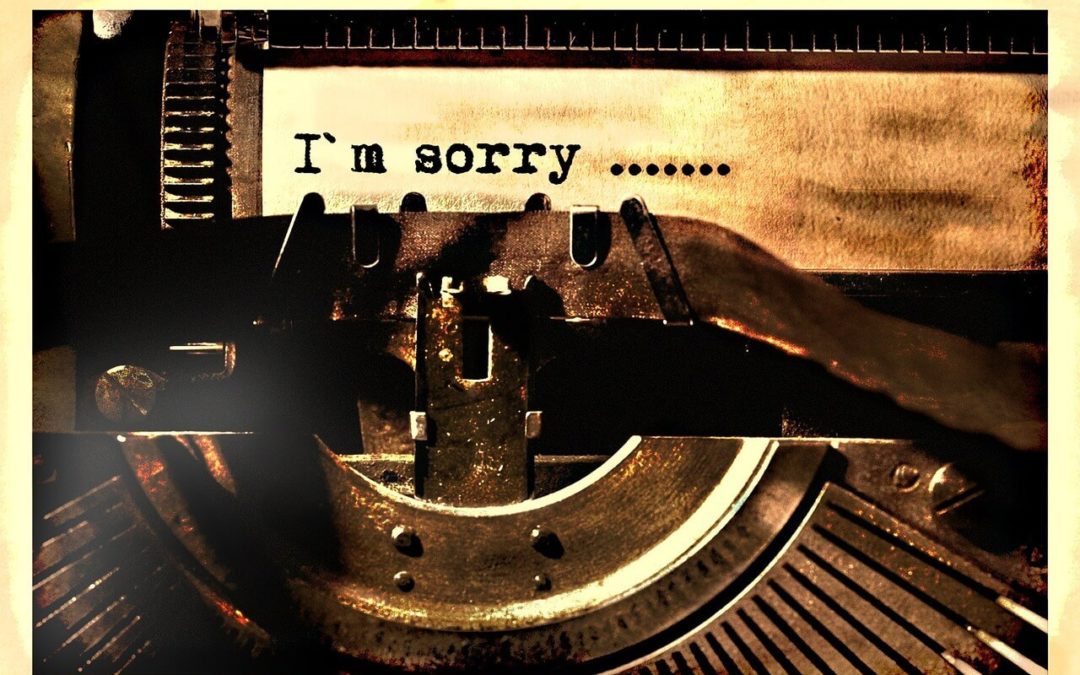“Never ruin an apology with an excuse.” ~Benjamin Franklin
The music industry doesn’t seem to have a problem with it. From Beyoncé’s “Sorry” to Blake Shelton’s “I’m Sorry” to Chicago’s “Hard To Say I’m Sorry,” there are more songs about apologizing than you can shake a stick at. (Never really understood that saying, but it seems to fit here).
So why are some humans so bad at it, and so many businesses can’t seem to get it right?
We all do it, both in our personal and professional lives. We mess up, fail to deliver, break things, don’t meet deadlines, ship products behind schedule and are late to meetings. We wrong people, and people wrong us. Why is it so hard to apologize, and apologize sincerely?
If you do it right, an apology can resolve a conflict, mend hurt feelings, improve relationships, foster forgiveness and actually increase repeat business.
If done wrong, you’re out of a job, out of a marriage or on the front page of a newspaper. Does United Airlines, Wells Fargo, BP or Goldman Sachs ring a bell? They were all criticized for their weak apologies in recent months and years. In contrast, one of the best examples of a corporate apology done right was back in 1982 by Johnson & Johnson, when 7 people died from taking Tylenol that were laced with cyanide. They recalled 31 million bottles and absorbed a loss of 100 million dollars. They immediately apologized, took responsibility (even though it wasn’t their doing) and made it right by coming up with the tamper proof bottle. They were back on the market within two months, and recaptured most of their market share within two years. Shameless plug alert! This is discussed in my book, Repeat Business, Inc: The Business of Staying in Business.
So if you’ve messed up, here are a few tips to remember:
- Time is of the essence. The longer you wait, the more difficult it will be.
- It’s best to apologize in person, second best on the phone, and last by email or text.
- Take responsibility. Don’t blame others, and definitely don’t blame the person you are apologizing to. Never use the word “but,” because it negates what you are saying. “I’m really sorry, but if you had told me Tom in accounting had the wrong information, I would have been able to do my job.” “I’m sorry but it’s not really my fault because no one told me traffic would be so bad.” Not good!
- Don’t let your ego get in the way. “I’m sorry you’re so sensitive and couldn’t tell that I was joking.” “I’m sorry if anyone was offended.” Not good!
- Mention what you are sorry for. “I am so sorry I didn’t finish the report on time. It won’t happen again.” Good!
- Don’t go on and on. Say you’re sorry, what you are sorry about, and it won’t happen again. Then move on.
- If someone is apologizing to you, be gracious and accept it. Then move on.
- A proper apology takes courage. If the situation warrants it, ask for forgiveness. “I’m sorry, I was wrong, will you forgive me?”
And finally, be sincere. If you don’t mean it, don’t say it.
As Justin Bieber sings in his song “Sorry”:
Is it too late now to say sorry?
Yeah I know that I let you down
Is it too late to say I’m sorry now?
Did I just bring Justin Bieber into all of this?
I am so sorry. That will never happen again.









